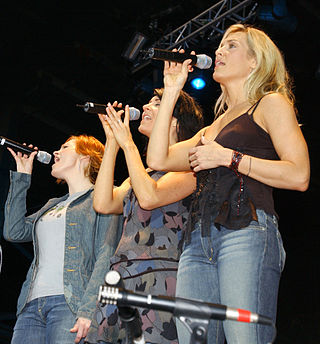Related Research Articles

Robert Allen Curtola, CM was a Canadian rock and roll singer and teen idol.

Stanley Robert "Bobby" Vinton is an American former singer and occasional actor, who also hosted his own self-titled TV show in the late 1970s. As a teen idol, he became known as "The Polish Prince", as his music paid tribute to his Polish heritage. One of his most popular songs is "Blue Velvet" which reached No. 1 on the Billboard Hot 100 in 1963, No. 1 in Canada, and number 2 in the UK in 1990.

SHeDAISY was an American country music vocal group from Magna, Utah. The group consisted of sisters Kristyn Robyn Osborn, Kelsi Marie Osborn, and Kassidy Lorraine Osborn. The group's name is derived from the word shideezhí, a Navajo term meaning "my little sister".

"Jingle Bell Rock" is an American Christmas song first released by Bobby Helms in 1957. It has received frequent airplay in the United States during every Christmas season since then, and is generally considered Helms' signature song. "Jingle Bell Rock" was composed by Joseph Carleton Beal (1900–1967) and James Ross Boothe (1917–1976), although both Helms and session guitarist on the song Hank Garland disputed this. Beal was a Massachusetts-born public relations professional and longtime resident of South Ocean Avenue in Atlantic City, New Jersey, and Boothe was an American writer in the advertising business.

"Do You Want to Dance" is a song written by American singer Bobby Freeman and recorded by him in 1958. It reached number No. 5 on the United States Billboard Top 100 Sides pop chart and No. 2 on the Billboard R&B chart. Cliff Richard and the Shadows' version of the song reached No. 2 in the United Kingdom in 1962, despite being a B-side. The Beach Boys notably covered the song in 1965 for their album The Beach Boys Today!. Retitled "Do You Wanna Dance?", their version reached No. 12 in the United States. A 1972 cover by Bette Midler with the original title restored reached No. 17.

"Take Good Care of My Baby" is a song written by Carole King and Gerry Goffin. The song was made famous by Bobby Vee, when it was released in 1961.
"Quando quando quando" is an Italian pop song from 1962, in the bossa nova style, with music written by Tony Renis and lyrics by Alberto Testa. The song, originally recorded in two different versions by Tony Renis and Emilio Pericoli, competed in the Sanremo Music Festival in 1962, where it placed fourth, and later became a commercial success in Italy, topping the Musica e dischi singles chart. American entertainer Pat Boone, who recorded the song in 1962, sang the English lyrics written by Ervin Drake.
A fortune teller is someone who practices fortune-telling.

"Mr. Lonely" is a song co-written and recorded by American singer Bobby Vinton, backed by Robert Mersey and his Orchestra. The song was first released on Vinton's 1962 album, Roses Are Red.

Fortuneteller's Melody is the fifth and final studio album by American country music trio SHeDAISY. It was released on March 14, 2006. The two singles from Fortuneteller's Melody, "I'm Taking the Wheel" and "In Terms of Love", reached 22 and 32 on the country charts, respectively, on the country charts. "God Bless the American Housewife" was released as a single in Canada, where it charted in the Top 20.
Del-Fi Records was an American record label based in Hollywood, California was founded 1958 and owned by Bob Keane. The label's first single released was "Caravan" by Henri Rose released in 1958, but the label was most famous for signing Ritchie Valens. Valens' first single for the label was "Come On Let's Go", which was a hit. His next single, "Donna"/"La Bamba", was an even bigger hit, and brought national notoriety to the label. Johnny Crawford, the co-star of the television series The Rifleman, was the Del-Fi artist who recorded the most hit singles.

"The Night Has a Thousand Eyes" is a song written by Benjamin Weisman, Dorothy Wayne, and Marilyn Garrett. It became a popular hit in 1962 for Bobby Vee and has had several cover versions over the years.

"Roses Are Red (My Love)" is a popular song composed by Al Byron and Paul Evans. It was recorded by Bobby Vinton, backed by Robert Mersey and his Orchestra, in New York City in February 1962, and released in April 1962, and the song was his first hit.

"Only Love Can Break a Heart" is a popular song from 1962, performed by the American singer-songwriter Gene Pitney. The song was written by Hal David (words) and Burt Bacharach (music) and appears on Pitney's second album Only Love Can Break a Heart.
"Lonely Street" is a 1956 song written by Carl Belew, Kenny Sowder, and W.S. Stevenson, originally performed by Belew, and later by Dave Rich. Its most successful rendition was by Andy Williams, whose version reached #5 on the Billboard chart and #20 on the R&B chart in 1959. The song appeared on his 1959 album, Lonely Street. Archie Bleyer's Orchestra played on the song.
"Unless You Care" is a song written by P.F. Sloan and Steve Barri and performed by Terry Black. It reached No. 2 on Canada's RPM Top 40 & 5 and No. 99 on the U.S. Billboard Hot 100 in 1964. The song was featured on his 1965 album, Only 16.

"Rain Rain Go Away" is a song released by Bobby Vinton in August 1962.
"Wildwood Days" is a song released by Bobby Rydell in 1963.
"As Long As I’m Sure of You" is a song written by Dyer Hurdon and Basil Hurdon, and recorded by Bobby Curtola in 1964. The song was a Canadian Top 40 hit, peaking at number 11 in 1964.
References
- ↑ "Bobby Curtola - Fortuneteller / Johnny Take Your Time". Discogs. 1962.
- ↑ "Fortuneteller". billboard. Retrieved 12 April 2018.